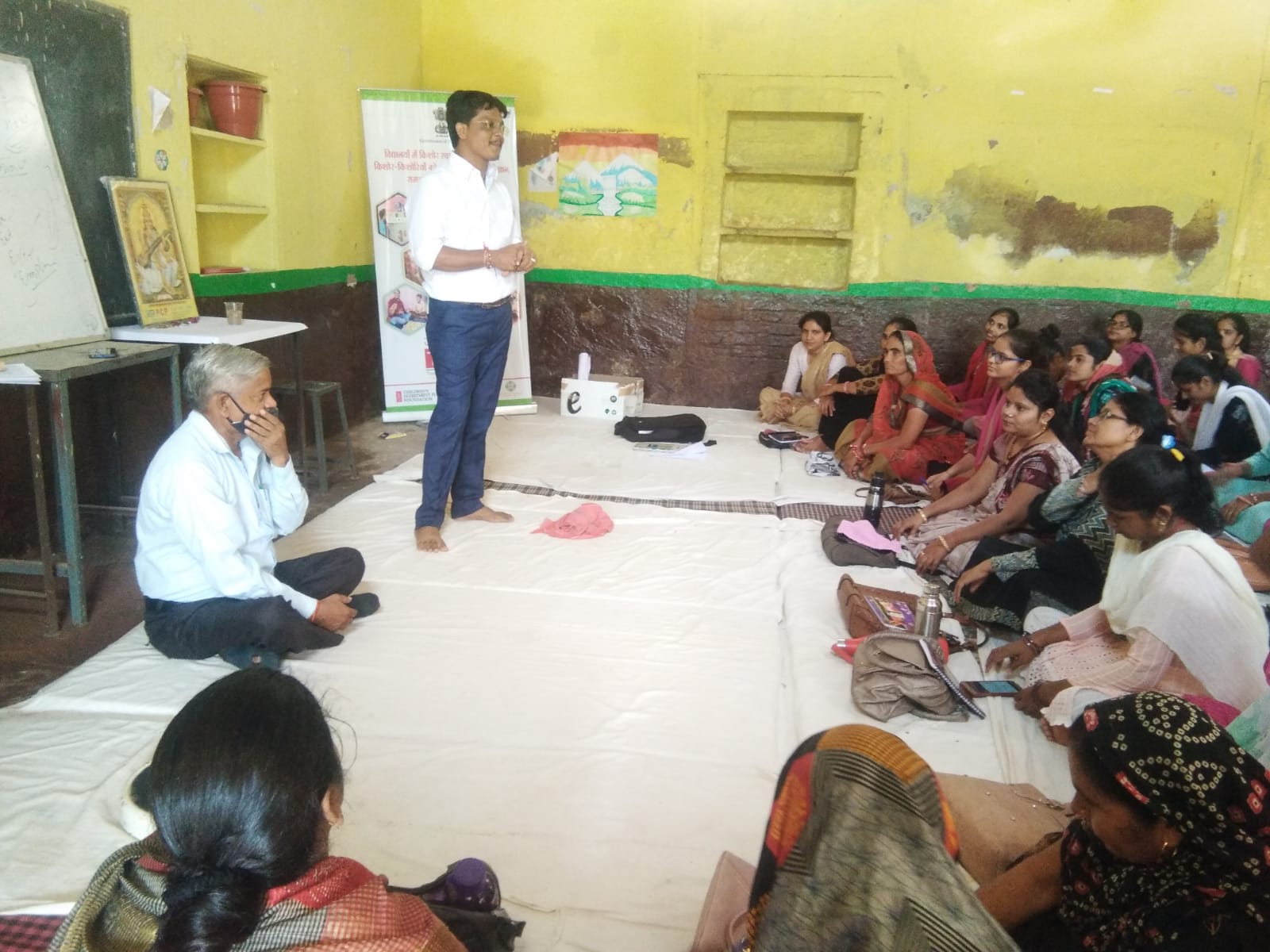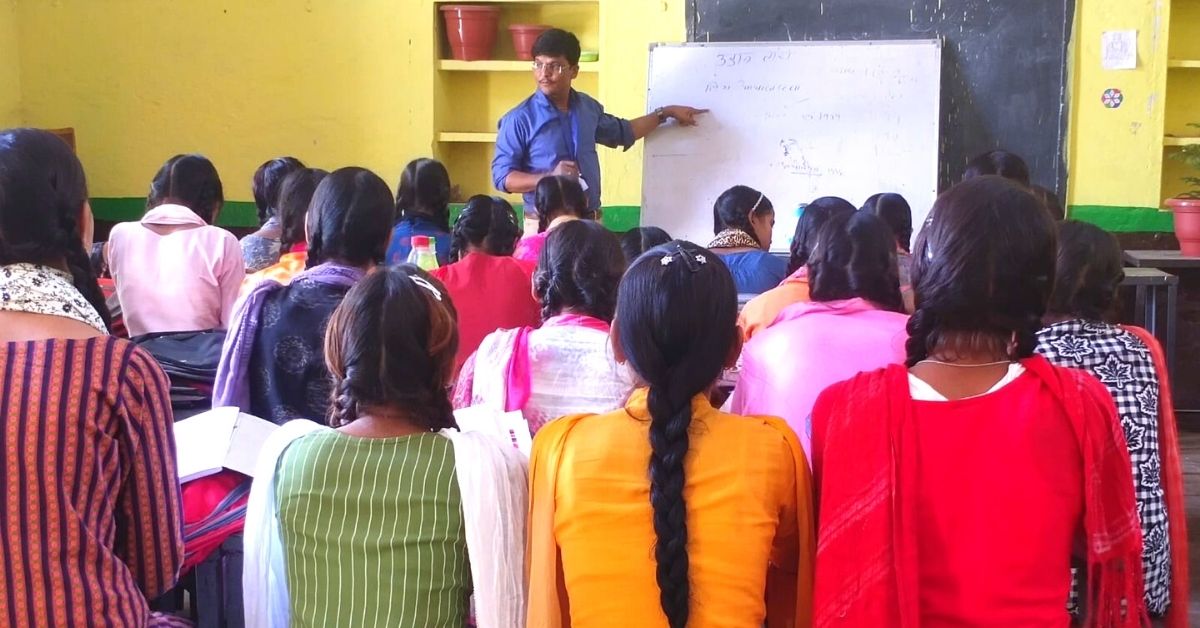‘After 10 Years as a Teacher, How I Taught Sex Ed to Others For The First Time’
Raju Sain, a teacher in Rajasthan, shares how he learnt the new curriculum on adolescent health as part of the ‘Udaan Tara’ initiative started by the Government of Rajasthan in 2018 and went on to shaping multiple lives.

In his 10 years of teaching, Raju Sain had never been this nervous. With sweaty palms and a fluttery stomach, he jotted down the points on safe birth control measures.
A resident of Sarmathura tehsil of Rajasthan’s Dholpur district, the 36-year-old was new to the modules of adolescent health (AH), despite teaching science.
Read More: 70,000 Copies Sold: 75 Rajasthani Villagers; And Their Bestseller on Women’s Sexuality
Asking questions or raising doubts on feminine hygiene, reproductive health and gender-based discrimination were frowned upon up until now.
Once back home, he decided it was best to not share his experience with his wife due to fear of being judged.
But it took only a few weeks to undo years of repression on mental and sexual health, as now Raju was not only sharing the curriculum he learnt with his wife but also training close to 350 teachers.

Raju learnt the new curriculum on AH as part of the ‘Udaan Tara’ initiative started by the Government of Rajasthan (GoR) and Children’s Investment Fund Foundation (CIFF), UK in 2018.
The project aims to sensitise the district through school students on comprehensive sexual and reproductive education to prevent issues like child marriages, unplanned pregnancies, sexually transmitted diseases, etc. The project also includes nutrition among adolescents, gender-based violence and mental health.
“Dholpur’s gender ratio is skewed in favour of males. This district is not doing great on social and economic parameters. When I joined, I evaluated the ongoing schemes in the district meant for the adolescent population. In addition to giving right information to adolescents, it is equally important that they are given this information at the right time through the right medium. The best part of the project is that experts in various fields have scientifically developed these modules,” District Collector RK Jaiswal tells The Better India.
Shri Rakesh Kumar Jaiswal, District Collector, Dholpur, Rajasthan launched a teachers’ training programme on #adolescenthealth curriculum on Tuesday. The curriculum for the training has been developed under the @CIFFchild funded project #Udaan of @IPEGlobal pic.twitter.com/gd2xFfSTcB
— IPE Global Limited (@IPEGlobal) November 25, 2020
While the district administration roped in NGOs like Manjari foundation and IPE Global to impart the curriculum, the real burden fell on teachers like Raju who were expected to simplify the topics while eradicating the myths.
“The general norm is to skip chapters that focus on body parts and topics that are considered taboos in our society. In rural areas, the fear of backlash from certain conservative groups and parents is very much real. But I am so glad this project was initiated in our region. Initially, I had my apprehensions but seeing the response from students and their parents, it is safe to say that a significant behavioural change is in the making,” Raju tells The Better India.
The administration appointed a Master Trainer from every village. Raju, who teaches at the Government Girls Senior Secondary school, was one of them.
A Grassroot Change

A father of two children (aged 11 and 6), Raju started teaching during his college days to support his family. Even though he graduated in law, he stuck to teaching after seeing the impact of education on children.
Raju is known for taking a friendly approach with his students and conducting interactive classes to teach maths and science in a more interesting way.
He was very excited when he was asked to take the responsibility of training other teachers. But little did he know that he would have to discuss ‘tabooed’ topics like menstrual hygiene and safe sex.
“Initially, I was confused as to why people are discussing it openly. The training sessions were eye-opening and we realised so many of our practices are illogical. The rationale behind not allowing women to work during menstruation could be because it is tiring and painful but we have twisted the reasons as per our whims and labelled menstruating women as untouchables. By the end of the training, I was comfortable and confident enough to ask questions,” says Raju.
However, things got tougher when Raju was among a group of teachers who were both senior and elder to him. For the first three days, they showed no enthusiasm or willingness to learn.
“I had to conduct multiple sessions to get them to open up because until they show interest, the situation is not going to change. In the process, I also ended up learning from them. The teachers started coming in with more questions in our feedback sessions, which showed that students were also taking an interest in the subject,” says Raju.
Talking about the significance of this curriculum, Raju says, “The targeted students are at an age where their bodies witness physical and hormonal changes. If their curiosity is not met, they can indulge in wrong habits. For example, nightfall is shamed, so instead of visiting a doctor, the boys often resort to porn or look for solutions online. In the same way, girls do not wear sanitary pads despite getting them for free due to the stigma. Such issues if not addressed correctly can affect their mental wellbeing as well.”
Ruby Kumari, a Class 12 student from Raju’s village has stopped feeling guilty every time she menstruates.
“No one told us periods are a natural phenomenon. Even my mother refused to tell me why it occurs. I wouldn’t even discuss it with my friends out of shame. If it pained, I would quietly go through it instead of asking for help. I would burn my sanitary napkin or reuse waste cloth while bleeding. Now, I bury it properly after knowing the health hazards of openly discarding it. Even in terms of marriage, we were informed that our body is ready only after we turn 18. Post the sessions I started sharing this with my mother,” Ruby tells The Better India.
The students are also taught good touch and bad, self-examination of genitalia for when to visit a doctor and nutritious food for a healthy lifestyle.
Raju shares the impact of the programme can be seen in his house too. He says, “We have started eating our dinner early and we are conscious of what we consume for breakfast.”
The programme has been taught to 60,000 students of Class 6 to Class 12 across more than 550 government schools in the district.
“The impact is for everyone to see. A lot of young girls and boys are now comfortable talking about sensitive issues. Many of them are even counselling elders in the family on themes such as family planning and child marriage. I know of stories of girls who are questioning traditional practices related to menstrual hygiene. I am able to visualise that eventually, there will be gender parity in the district. In the long run, we see the infant mortality rate going down. When this happens (the target is met), the government resources currently spent to fight these factors will go down,” adds the District Collector.
(Edited by Yoshita Rao)
If you found our stories insightful, informative, or even just enjoyable, we invite you to consider making a voluntary payment to support the work we do at The Better India. Your contribution helps us continue producing quality content that educates, inspires, and drives positive change.
Choose one of the payment options below for your contribution-
By paying for the stories you value, you directly contribute to sustaining our efforts focused on making a difference in the world. Together, let’s ensure that impactful stories continue to be told and shared, enriching lives and communities alike.
Thank you for your support. Here are some frequently asked questions you might find helpful to know why you are contributing?


This story made me
- 97
- 121
- 89
- 167











